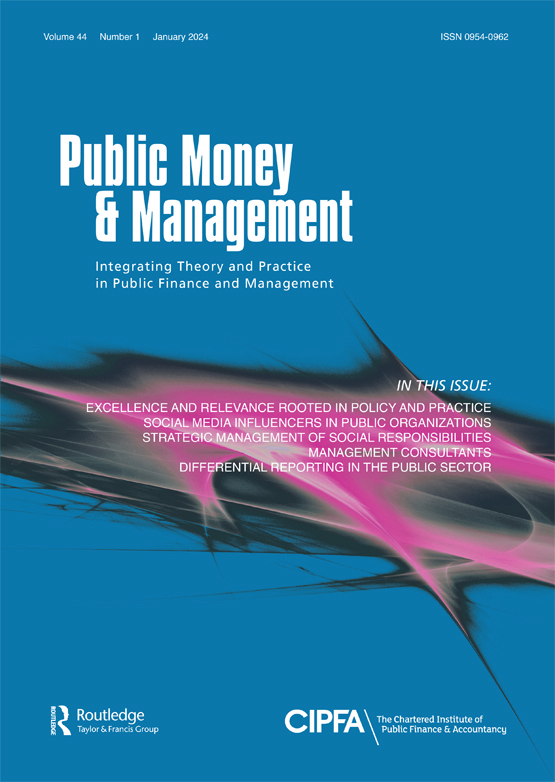Submit a Manuscript to the Journal
Public Money & Management
For a Special Issue on
Public sector entities building a more sustainable world: managing, measuring and informing on the SDGs
Manuscript deadline
01 June 2024

Special Issue Editor(s)
Francesca Manes Rossi,
University of Naples ‘Federico II’, Italy
[email protected]
Patria De Lancer Julnes,
University of New Mexico, USA
[email protected]
Annamaria Zampella,
University of Naples ‘Federico II’, Italy
[email protected]
Public sector entities building a more sustainable world: managing, measuring and informing on the SDGs
Public sector entities are responsible for the well-being of communities, preserving environmental resources, mitigating climate change, and developing the necessary social and cultural conditions for sustainable growth (Ball et al., 2014; Guthrie & Farneti, 2008). In 2015 the United Nations agreed on the 2030 Agenda for Sustainable Development, including 17 Sustainable Development Goals (SDGs; see https://sdgs.un.org/goals), articulated in 169 targets and 232 unique indicators to monitor progress. Looking at the 2030 Agenda, it is clear that the SDGs should be at the core of the mission of any public sector entity, including all levels of government, healthcare organizations, schools and universities, and museums and cultural heritage sites.
The role of public sector entities consists of not only dealing with sustainable development but also encouraging and supporting actions with civil society and private business entities (Abhayawansa et al., 2021). Moreover, the digital transformation and the use of artificial intelligence are opening new opportunities in public service delivery and in engaging citizens in co-designing and co-creating public services that better meet the expectations of a new generation of citizens and in re-thinking smart cities for a more sustainable society (Moon, 2023; Onyango & Ondiek, 2021). Scholars are now beginning to develop theoretical and empirical insights on SDGs in public financial management. There have been calls for deeper and broader research touching upon SDGs reporting and the use of accounting information (Cohen, 2022), climate-related financial disclosure (Bebbington & Unerman, 2020), strategic planning and management tools (Guarini et al., 2021), why and how some governmental bodies are consciously operating towards sustainable development and others aren’t (Bisogno et al., 2023), and how to drive the adoption of SDGs (Spangenberg, 2017).
Higher education institutions now need to revise their academic programmes to create a new generation of public managers and civil servants who will focus on the values, logic and tools needed to achieve the SDGs (Caruana & Dabicco, 2022). Moreover, the 2030 Agenda also calls for public sector organizations to adopt policies, strategies or measures to achieve SDGs (Bouckaert et al., 2016). However, research on the role, tools, experiences and future challenges impacting public sector entities in achieving SDGs still needs to be explored.
We, the guest editors of this important PMM theme, believe that the 2030 Agenda represents a pathway for engaging various actors in rethinking, managing and reporting on sustainable development issues. Thus, we aim to collect new contributions that can shed light on public sector entities' role in creating a more sustainable society. The wide array of challenges deriving from the SDGs requires the contribution of scholars dealing with public financial and performance management from alternative perspectives and from a multidisciplinary research perspective (Jacobs & Cuganesan, 2014; Bebbington & Unerman, 2020). Consequently, the guest editors papers within the broad area of public sector financial and performance management dealing with SDGs, welcoming multidisciplinary theoretical and methodological approaches. The research may be contemporary, historical or comparative. However, we do not seek literature review articles.
Research may touch on—but should not necessarily be limited to—the following topics:
- SDG reporting practices and experiences.
- SDG budgeting and green budgeting.
- Performance management in support of SDGs.
- Digitalization as a challenge for communication on SDGs.
- Experiences in participatory budgeting oriented to SDGs.
- Artificial Intelligence challenges and opportunities in managing SDGs.
- Engaging citizens, civil society organizations and business entities in designing public strategies and actions toward SDGs.
- Tools and experience to manage climate change in public sector organizations.
- Rethinking gender equality in the context of SDGs.
- Educating future public managers about sustainable development.
- Public service management for sustainable services.
- Management, governance and accountability of smart cities.
- Smart technologies for SDGs.
Looking to Publish your Research?
Find out how to publish your research open access with Taylor & Francis Group.
Choose open accessSubmission Instructions
The theme will include research manuscripts (up to 8000 words, including references), debate articles (up to 1000 words) and new development articles (up to 3500 words). The guest editors will review the debate and new development contributions; research manuscripts will be double-blind refereed by both an academic and a practitioner. See the journal’s instructions for authors: https://www.tandfonline.com/journals/rpmm20
Interested researchers are invited to submit contributions for consideration via PMM’s online submission portal: https://mc.manuscriptcentral.com/rpmm. Select “Sustainabilty reporting in the public sector” from the dropdown menu under “Is the manuscript a candidate for a special issue?” Articles submitted to PMM for review must not be under consideration by any other publication outlet.
Accepted articles will be published online on acceptance. The publication of the theme is expected in the early 2025.
Contact Francesca Manes Rossi ([email protected]) for questions about the theme. The deadline for submission of research articles via the PMM online platform is 1 June 2024. The deadline for debate and new development articles is 1 August 2024.